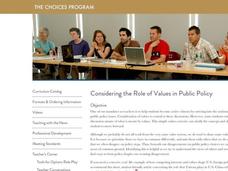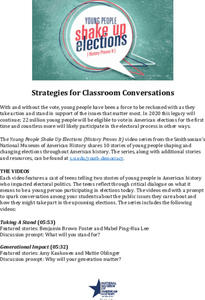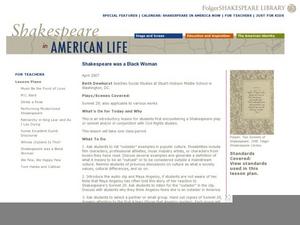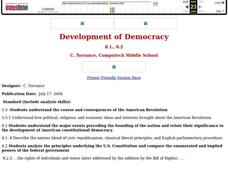Franklin D. Roosevelt Presidential Library & Museum
What Does It Mean to Be an American?
A series of four activities focuses young scholars' attention on what it means to be an American. They identify key qualities, values, and virtues they consider shared by Americans. Participants then pretend they have been selected to...
Brown University
Considering the Role of Values in Public Policy
Strong opinions come from deeply held values. Young citizens explore the values that are most important to them in a class discussion and activity. As they prioritize a list of values cards that include freedom, justice, and democracy,...
Carolina K-12
African Americans in the United States Congress During Reconstruction
The Civil Rights Act of 1866, which granted citizenship to all males in the U.S., resulted in the first African Americans to be elected to Congress. Class members research 11 of these men, the challenges they faced, and craft...
DocsTeach
Analyzing a Letter About American Indian Voting Rights
An informative activity focuses on the law preventing Native Americans from voting until 1947. Scholars read documents from the Office of Indian Affairs, complete an online worksheet, and participate in group discussion. Academics learn...
North Carolina Consortium for Middle East Studies
Missing Pieces of the Puzzle: African Americans in Revolutionary Times
What's missing from most studies of the American Revolutionary War is information about the role African Americans played in the conflict. To correct this oversight, middle schoolers research groups like the Black Loyalists and Black...
Judicial Branch of California
Defining Civic Duty and Participation
A lesson, geared toward older elementary scholars, combines art with social studies to explain the purpose of civic duty and how to encourage others in the community to participate. Academics create advertising campaigns to promote civic...
Judicial Branch of California
Public Service Announcement: Civic Responsibility
Get your message across. Scholars use their prior knowledge and artistic skills to create public service announcements. The project is designed to explain the importance of civic harmony and the responsibility of all citizens to...
Curated OER
Let Your Motto Be Resistance: African American Portraits: Grades 3-5
Young scholars explore the contributions of African Americans of the 20th century. In this African American history lesson, students examine portraits of Muhammad Ali, Romare Bearden, Lorraine Hansberry, Judith Jamison, and Leontyne...
Curated OER
Good Citizens
Students consider what qualities and values make a good citizen. Students compare the requirements to become a U.S. citizen in 1896 to current requirements. Students create a country and write out the qualities a good citizen would possess.
Curated OER
Valuable Lessons
Students explore how immigration, citizenship, due process of law, and the freedoms of speech and assembly have shaped American values throughout American history
Curated OER
We the People…in the News
Students use the newspaper to explore the world around us, our past and our government. For this civics unit, students complete 40 different lessons in civic education using that day's newspaper to reinforce the concept being taught.
Smithsonian Institution
Young People Shake Up Elections (History Proves It) Educator Guide
Vote, it's your civic duty! The resource provides several videos about voting in the United States. Scholars watch a series of topics ranging from youth participation to civic action. The educator's guide provides teachers with...
Curated OER
Shakespeare Was A Black Woman
"I all alone beweep my outcast state." After a discussion of the "Shakespeare in American Life" segment in which Maya Angelou's relates her reaction to Sonnet 29, class groups create and perform a scene about an outcast that includes the...
Curated OER
Checks and Balances: Japanese-American Incarceration
Middle schoolers examine the three branches of the Federal Government and their decision to place Japanese-Americans in camps during World War II. They analyze debates made by leaders during this time period.
Center for Civic Education
The Power of Nonviolence: The Children's March
What was the Children's Crusade and how did it impact the civil rights movement in the United States? Your young learners will learn about this incredible event through a variety of instructional activities, from reading a poem and...
Curated OER
American History Through the Len of the Supreme Court Decisions
Students examine the historical background of Supreme Court decisions and the basic principles behind legislation. As part of the lesson, students discover legal concepts and terms and write sentences using the vocabulary they have...
Teaching Tolerance
The True History of Voting Rights
Explore what voting rights really are in an intriguing lesson plan that explores the history of American voting. The resource examines the timeline of voting rights in the United States with group discussions, hands-on-activities, and...
Judicial Branch of California
Where We Fit In: The Judicial Branch
An interesting resource addresses the role of youth in civic participation and community events. It also explains the role of the justice system in creating boundaries and how citizens play a part in the judicial process. Pupils listen...
Judicial Branch of California
Faces of Citizenship: Jury Duty
An interesting middle school lesson focuses on the rights and responsibilities of citizens. Academics choose a civic project to complete, such as an oral history or photo essay. They then conduct interviews with members of the community...
Curated OER
It's in Your Pocket
Learners examine American coins. In this American currency lesson, students study how American money came to be as well as the responsibilities of the U.S. Mint. Learners discover details regarding American coins and design their own coins.
Curated OER
Social Studies: 9/11 Banners
Students explore the history of flags and design banners for their communities. their designs reflect sentiments shaped by the events of 9/11. In addition, they write phrases beginning with, "being an American means..." Students...
Curated OER
The Pledge of Allegiance
Young scholars explore the meaning of the Pledge of Allegiance. In this civics lesson, students examine the document, define related vocabulary words, and rewrite it in their words.
Curated OER
Development of Democracy
Eighth graders examine the road to the American Revolution. In this Boston Massacre lesson, 8th graders investigate the testimony of Captain Thomas Preston. Students write their own verdicts based on his testimony.
Curated OER
Comparing Foundations of Democracy
Students examine democratic values. In this democratic ideologies lesson, students discuss individual rights and rights of the group. Students also discuss the implications of the priorities made in democratic societies regarding rights.

























